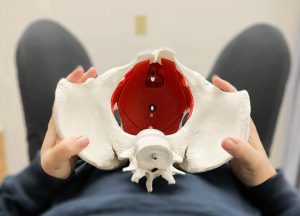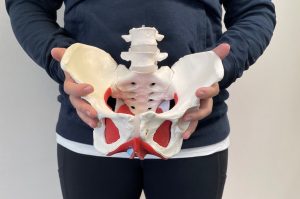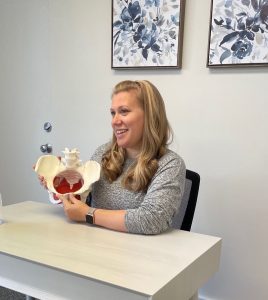From leaking urine to ongoing back pain, women experience so many pelvic health changes following pregnancy and childbirth that are common, and sometimes frustrating, but they are often very treatable. Read about the five most frequently asked questions by postpartum women to a pelvic floor physical therapist.


Why do I leak urine after having a baby when I cough, sneeze, laugh, jump or exercise?
Whether you had a vaginal or Cesarean delivery, the pelvic floor undergoes significant changes during pregnancy and delivery. These changes may result in weakness, tightness, tearing or laxity within the pelvic floor. Our pelvic floor muscles are designed to support internal organs, such as the bladder, as well as effectively close the urethra to prevent urine from leaking out. If these muscles are not functioning optimally after pregnancy or delivery, it is very common for urine to leak with activities that increase pressure in the abdomen and pelvis. But just because it is common, it does not mean you have to live with it forever! And it certainly does not mean you have to avoid laughing or jumping on the trampoline with your rambunctious kiddos. Pelvic floor therapy can be incredibly effective at reducing or eliminating this issue.
What is diastasis recti and how do I know if I have it?
Diastasis recti is often referred to as a “separation” of the abdominal muscle, though perhaps is more accurately described as a laxity within the middle of the abdominal wall. As the uterus grows during pregnancy, the midline between your abdominal muscles widens as the belly expands. It is incredibly common to have this at the end of a full-term pregnancy – some research shows it occurs in more than 95% of women! During the postpartum period, you may notice bulging or a valley at the midline of your abdomen with core exercises, or you may be able to sink your fingers more deeply into your abdomen above, at, and/or below the belly button than you can to either side of midline. A pelvic floor therapist can assess the severity of a diastasis and whether or not you would benefit from treatment.
Why do I still have low back pain even after delivering my baby?
Some women may have improved pain fairly quickly after delivery, but unfortunately, many will not. But still, most of us are told back pain is just one more issue we have to deal with while we are pregnant that is supposed to magically go away once the baby is here. A variety of factors can lead to back pain during pregnancy – increased weight gain in the abdomen, decreased abdominal support, changes in posture, altered center of gravity, laxity due to hormonal changes, and changes to pelvic floor function. Many of these factors do not spontaneously resolve following the birth of a baby, and may require time and/or rehab to recover effectively and fully.
Will sex always hurt after having babies?
No! Just because it is common to have pain with intercourse following birth, does not mean it is normal. Many women who have a C-section are surprised when sex is painful postpartum, assuming that without a vaginal delivery this should be unaffected. Unfortunately, intercourse may be painful or difficult for either type of birth. The changes to the pelvic floor muscles from pregnancy and delivery are likely to blame again, along with the presence of scar tissue and hormonal changes. The good news is, there is treatment to help resolve the problem and it is definitely not something to just accept as the new norm once you have kids.
And the 5th and final question of the 5 Most Common Questions About Postpartum Pelvic Health:
How do I know if I even need to go to pelvic floor PT?
It is not (yet!) common in the United States for all women to be referred to pelvic floor PT following delivery, but in other countries, this is a standard referral at the 6 week follow-up appointment with your OB or midwife. Most women will benefit from seeking a pelvic floor evaluation postpartum. This will ensure full recovery for general function, safe return to exercise, prevention of other orthopedic injuries due to compensations, prevention of pelvic floor conditions rearing their heads later on in life (hello, menopause!) and full recovery prior to supporting another pregnancy. Certainly, if you are experiencing symptoms, pain or dysfunction, pelvic floor PT would be recommended. Learn more about common postpartum issues, what you can do about them and pelvic floor health in our monthly newsletter.  ReclaimHER Physical Therapy combines orthopedic and pelvic floor physical therapy and specializes in preconception through postpartum care. We are passionate about advocating for women’s health (as we hope translated in our answers to the 5 Most Common Questions About Postpartum Pelvic Health) and providing education to the community to empower women to take charge of their physical health and happiness. Learn more about our services at our website, or get in touch with us directly by contacting us.
ReclaimHER Physical Therapy combines orthopedic and pelvic floor physical therapy and specializes in preconception through postpartum care. We are passionate about advocating for women’s health (as we hope translated in our answers to the 5 Most Common Questions About Postpartum Pelvic Health) and providing education to the community to empower women to take charge of their physical health and happiness. Learn more about our services at our website, or get in touch with us directly by contacting us.
ReclaimHER Physical Therapy
47A River Street, Suite A100
Wellesley Hills, MA 02481
IG: @reclaimherpt
(781)285-6135












